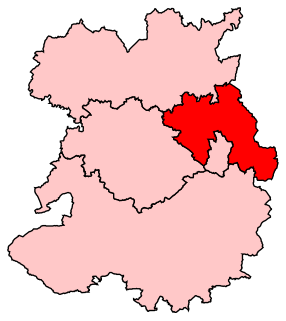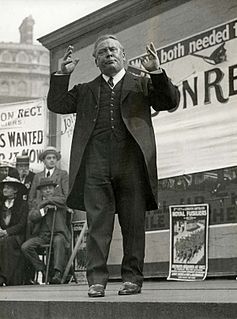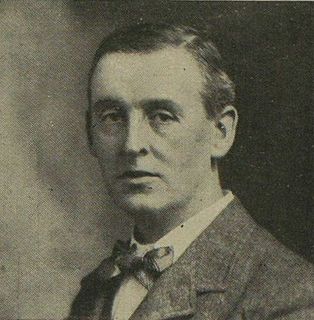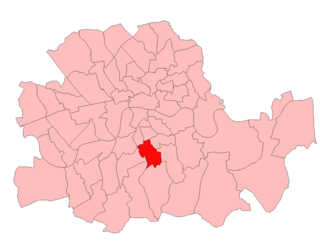The Wrekin by-election of 1920 was held on 7 February 1920. The by-election was held due to the death of the incumbent Coalition Liberal MP, Sir Charles Henry Bt. It was won by the Independent Conservative candidate Charles Frederick Palmer, [1] who was backed by Horatio Bottomley's Independent Parliamentary Group.

The Wrekin is a constituency in the House of Commons of the British Parliament, located in the county of Shropshire in the West Midlands of England. It has existed continuously since its creation by the Representation of the People Act 1918, and is named after a prominent landmark hill in the area, The Wrekin. The constituency has periodically swung back and forth between the Labour and Conservative parties since the 1920s, and has been held since 2005 by a Conservative MP, Mark Pritchard.

Horatio William Bottomley was an English financier, journalist, editor, newspaper proprietor, swindler, and Member of Parliament. He is best known for his editorship of the popular magazine John Bull, and for his patriotic oratory during the First World War. His career came to a sudden end when, in 1922, he was convicted of fraud and sentenced to seven years' imprisonment.
Although forced out of Parliament through bankruptcy in 1912, Bottomley had come back as an Independent in his old seat of Hackney South in 1918. He formed the Independent Parliamentary Group and sensed the growing unpopularity of the Coalition and the reluctance of many working men and women to give wholehearted support to a Labour Party still feared as introducing the novelty of socialism to British politics. Bottomley knew from his own brand of populist, jingoistic, politics that, as Palmer put it, "there is an immense body of sound opinion in the working classes which ranges itself on the side of King and Constitution." [2] In this climate, Bottomley understood that here was an opportunity to try add create a new third force in Parliament, anticipating the upsurge of opinion which was to produce good results for Anti-Waste candidates in the coming months. He persuaded Palmer to stand for election in The Wrekin and in a three-cornered contest against a Coalition Liberal and a Labour candidate, Palmer – without the advantages of local organisation or local connections and strongly supported by Bottomley himself – won a stunning and unexpected victory. The Coalition candidate, John Bayley, who had been closely associated with the previous MP and was well known locally as principal of Wellington College could only come in a poor third place.
Hackney South was a parliamentary constituency in "The Metropolis". It was represented by nine Members of Parliament to the House of Commons of the Parliament of the United Kingdom, only two of whom, Horatio Bottomley and Herbert Morrison, were returned.
The Independent Parliamentary Group was a right-wing political organisation in the United Kingdom. It was founded in 1920 by Horatio Bottomley, elected in the 1918 general election as an independent Member of Parliament.
The Anti-Waste League was a political party in the United Kingdom, founded in 1921 by the newspaper proprietor Lord Rothermere.
| Party | Candidate | Votes | % | ± | |
|---|---|---|---|---|---|
| Independent Conservative | Charles Frederick Palmer | 9,267 | 40.7 | ||
| Labour | Charles Duncan | 8,729 | 38.4 | ||
| C | Liberal | John Bayley | 4,750 | 20.9 | N/A |
| Majority | 738 | 3.7 | −12.9 | ||
| Turnout | 20,502 | 82.3 | +13.9 | ||
| Conservative hold | Swing | ||||
| Cindicates candidate endorsed by the coalition government. | |||||
Palmer died on 25 October 1920 from double pneumonia and pleurisy after catching a chill during a visit to the Wrekin. [4] Another by-election was held in November, also won by a Conservative opposed to the coalition, Charles Vere Ferrers Townshend.

Pleurisy, also known as pleuritis, is inflammation of the membranes that surround the lungs and line the chest cavity (pleurae). This can result in a sharp chest pain with breathing. Occasionally the pain may be a constant dull ache. Other symptoms may include shortness of breath, cough, fever or weight loss, depending on the underlying cause.





